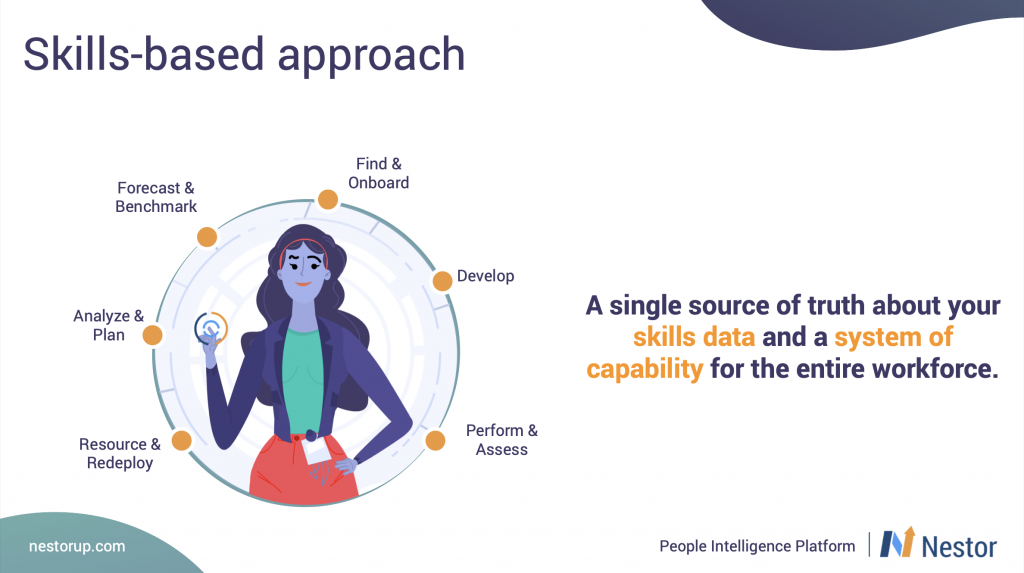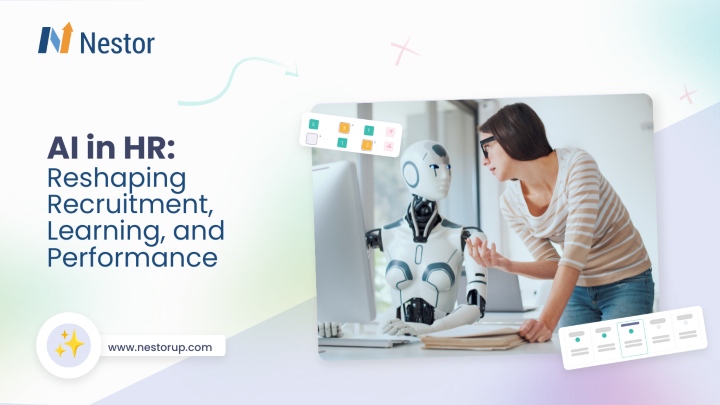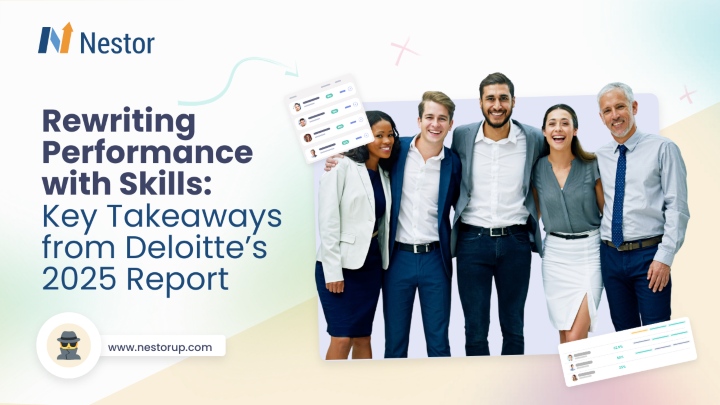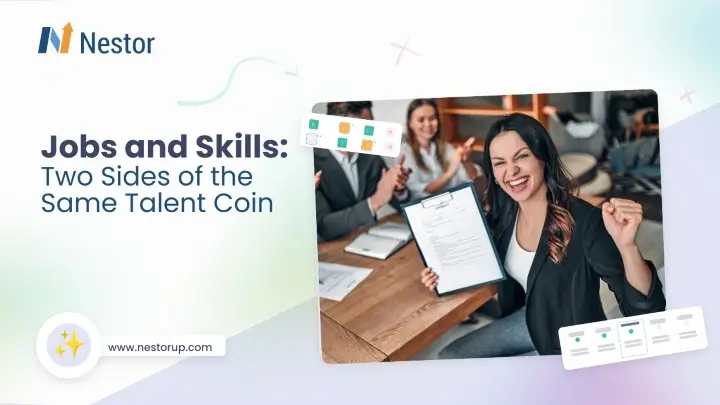Driving Business Performance with Skills-Based Talent Management
8 min read

In a world where the half-life of a skill is around 5 years and by 2030, we will have to reskill more than 1 billion people, according to the WEF, the shift to skills-based talent management can make a huge difference in how well organizations attract, develop, and retain top talent.
But what’s wrong with the traditional talent management process? And how are skills-based strategies better? We’ll explore these areas and answer many other questions in this article. Let’s dive right in!
Skills-based talent management vs traditional talent management
Skills-based talent management is an approach that uses employee skills and competencies as the starting point for attracting, identifying, developing, and retaining talented individuals.
The main difference between skills-based talent management vs traditional talent management is their focus:
- skills-based models for talent management focus on skills and capabilities, enabling organizations to discover the whole potential of an employee regardless of their past experience and credentials
- traditional models for talent management focus instead on job titles, experience, education, or personal connections
Why traditional talent management is failing to achieve the desired outcomes?
There are several reasons why traditional talent management practices are becoming less effective in today’s world and are being replaced by skills-based talent management. We are highlighting below two of the most important factors.
Rapidly evolving jobs with new skill requirements
The job market is constantly evolving, with new technologies, industries, and job roles emerging regularly. Consider the fact that jobs like artificial intelligence engineer, social media influencer, or blockchain analyst, just to name a few didn’t even exist 10 years ago.
Finding individuals who can perform these jobs would be almost impossible taking into consideration the limitations of traditional talent management that relies mostly on rigid job titles and predefined career paths.
Instead, skills-based talent management allows organizations to adapt to new roles and requirements more effectively by breaking down jobs into specific skills. The focus isn’t on finding candidates who possess the whole area of skill set required but rather on identifying individuals with high potential, with adaptable and transferable skills and knowledge.
Digital disruption and remote work
The digital revolution has transformed the way we work, enabling remote collaboration and the emergence of the gig economy. Traditional talent management may overlook individuals with valuable skills who may not fit the conventional mold but can contribute significantly in a remote or flexible work environment.
What are the benefits of skills-based talent management?
By leveraging skills-based practices, organizations can manage talent more effectively, gain a competitive advantage and stay relevant in this fast-paced business environment. Here are some of the benefits:
- A more inclusive and diverse workforce: When it comes to recruitment or promotion, skills-based strategies will ensure that the right candidates are given the opportunities they deserve, irrespective of other factors that would weigh more during traditional management.
- Improved productivity and engagement: Having the right skills for their roles and feeling that their abilities are used to their fullest will make employees more engaged and allow them to perform their tasks effectively and efficiently.
- Better talent retention through internal mobility: We know for a fact that growth and development opportunities are among the top reasons people choose to stay (or not) with their employer. And by enabling internal mobility and personalized career paths, organizations will gain higher rates of employee satisfaction and loyalty.
- Increased organizational agility and adaptability: Skills-based models enable companies to quickly identify and respond to the changing market dynamics and emerging skills needs of the economy. The transferable nature of (soft) skills plays a crucial role in the increase of flexibility across different departments and teams.
- Lowered overall costs: Skills-based initiatives will streamline the recruitment process and increase the likelihood of selecting the best-fit candidates, who are likely to stay with the organization longer. Additionally, skill-based talent management also prioritizes internal training and progression, which is cheaper than outsourcing or hiring external talent.
- Lifelong learning and upskilling: Continuous learning and upskilling have become essential in today’s fast-paced world. Traditional talent management often fails to account for an individual’s potential and willingness to learn and adapt. Skills-based talent management emphasizes ongoing development and provides personalized opportunities for employees to acquire new skills and grow within the organization.
How to improve your talent management efforts and drive better outcomes with a skills-based approach

The skills-based model follows the same steps of the traditional talent management process — planning, attracting, selecting, developing, retaining, and transitioning — but with skills and competencies as the core or single source of truth. Let’s have a closer look at each area:
Skills-based strategies and planning
Whether you want to adopt skill-based models in one area or organization-wide, the first steps are clearly defining:
- current and future business needs and objectives
- current (and ideally, future) skills required to achieve those objectives
- methods of collecting, assessing, and leveraging reliable skills data
- ways to evaluate and improve your skills-based talent management efforts
Skills-based recruiting and hiring
A skills-based approach is like a breath of fresh air in a world where job titles, experiences, and certifications can no longer reveal the true capability and suitability of a specific candidate.
It enables recruiters and hiring managers to look at much wider pools of candidates and quickly screen them based on the required and preferred (or desired) skills of the organization.
Skills-based models also facilitate the creation of clear job descriptions, which list easy-to-understand expectations and ability levels, encouraging anyone to apply and be considered regardless of their formal education or experience.
To succeed in this process, it’s important for HR to have an open mind and understand that skills and expertise can be developed through a wide range of career paths, learning experiences, and even life situations.
Skills-based development and training
The old way of having development plans based on job requirements is ineffective and even dangerous since requirements and jobs can change or even disappear entirely.
This is why a skills-based approach, developed from internal skill gap insights, can completely revamp the L&D departments and how companies approach learning at a cultural level.
By its nature, skills-based talent management emphasizes and encourages continuous growth. From one organization to another, this can take various forms, beyond traditional workshops or courses, such as:
- experiential learning
- mentoring
- coaching
- job rotation
- job shadowing
Personalized or targeted learning initiatives will also ensure that employees have access to development opportunities that are tailored to their specific needs and potential. This will not only increase the effectiveness of upskilling initiatives but will also ensure that resources are invested in solutions that provide real value and drive business growth.
Skills-based performance management and appraisals
Performance evaluations are another area where skills-based practices can have a powerful impact.
Traditional ways of evaluating performance are limited and past-oriented. They look at variables that can no longer be changed and often lead employees to focus on aspects that don’t contribute to their growth.
A skills-based approach to performance management will bring together performance reviews and development plans, ensuring that people know where they are and where they aim or need to be.
The goal is no longer solely about meeting 100% of KPIs. Rather, it’s about looking at progress over the short and long term and taking proactive steps to support the people’s development instead of stifling it.
This also opens the doors to more meaningful 360 feedback and regular one-on-one meetings, allowing managers to understand the challenges of their people and what specific behaviors need to change to deliver even better results.
Skills-based succession planning and career development
Thanks to skills framework and taxonomies — which are essential to skills-based talent management — organizations can define clear and transparent career development and succession plans.
By understanding the exact (skill) needs and expectations of each role, HR and people managers can identify people with the potential to progress faster and then take proactive steps to speed up their development.
Another benefit of this skills-based model is the lowered risk of favoritism, which means anyone can make vertical or lateral moves as long as they have the skills or show the willingness and initiative to improve them.
Don’t be surprised if skills-based talent management will help you identify hidden gems or people with great leadership potential but who would otherwise be overlooked or overshadowed by other candidates.
How skills platforms can support skills-based talent management
Various HR tech platforms can simplify and speed up your transition to skills-based talent management. The benefits derived from each will vary based on their functionality and how well they meet your specific business needs.
While some solutions focus on a single specific aspect of talent management (e.g., recruiting and hiring), others unite different areas under the same roof.
For example, at Nestor, we bring together performance management, employee engagement, and career development — all based on skills, a unifying and reliable source of truth.
Our platform will help you identify real-time skill gaps and create skill taxonomies, which will represent the basis for the development and retention of your talented workforce. With individual employee skills profiles and a talent marketplace, identifying and encouraging overall growth will be greatly simplified and streamlined.
Schedule a free demo to learn more.








